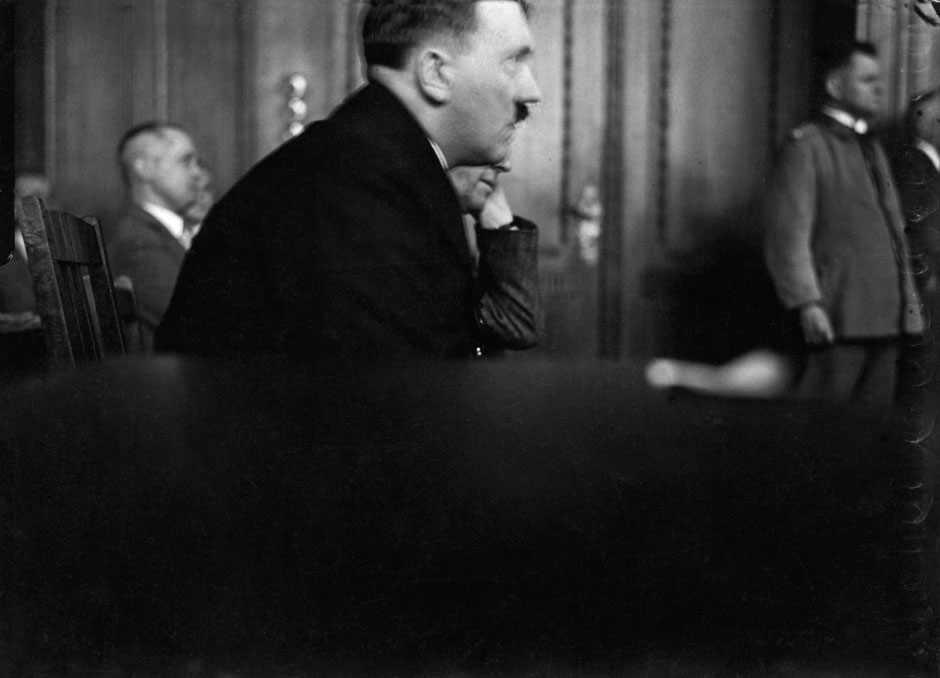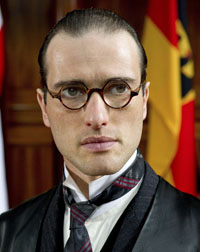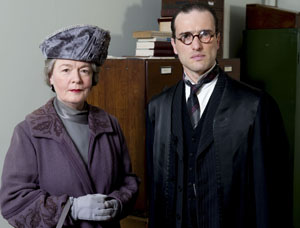The Man Who Crossed Hitler, BBC Two | reviews, news & interviews
The Man Who Crossed Hitler, BBC Two
The Man Who Crossed Hitler, BBC Two
Unusual and effective take on the rise of Hitler in the 1930s
Out of the blue, in the middle of the midsummer slump, came this unusual and original one-off play (I say "play" because it would convert naturally to the stage). Finding a new angle from which to explore Hitler and the Nazis might seem impossible, since few subjects have had their bones picked clean more obsessively. A keg of schnapps, then, to writer Mark Hayhurst, who successfully pulled this one out of his hat.
Ed Stoppard played Hans Litten, a young left-leaning Jewish barrister in Berlin at the start of the Thirties. Not a great time for Germany, obviously (described as "a failing democracy in economic meltdown" in a slightly over-prescriptive opening caption), with Hitler's SA - better known as the brownshirts - running amok and beating and murdering political opponents and Communists as they saw fit.
 The trigger for the ensuing action was a raid by the SA's Storm 33 unit on the Eden Dance Palace Comrades' Club, a leftists' rendezvous wallpapered with people's revolutionary posters. After a savage orgy of shooting and clubbing that left three dead and 20 injured, some of the perpetrators were put on trial, and young Litten, in his prosecutor's role, saw an opportunity to put Hitler on the witness stand and expose his political brutality and intimidation to public view. (Hitler pictured above in the trial, 1931, by Leo Rosenthal © Landesarchiv Berlin/courtesy Schirmer/Mosel)
The trigger for the ensuing action was a raid by the SA's Storm 33 unit on the Eden Dance Palace Comrades' Club, a leftists' rendezvous wallpapered with people's revolutionary posters. After a savage orgy of shooting and clubbing that left three dead and 20 injured, some of the perpetrators were put on trial, and young Litten, in his prosecutor's role, saw an opportunity to put Hitler on the witness stand and expose his political brutality and intimidation to public view. (Hitler pictured above in the trial, 1931, by Leo Rosenthal © Landesarchiv Berlin/courtesy Schirmer/Mosel)
At an earlier trial in Leipzig, Hitler had officially renounced violence and seemed to distance himself from the thuggery of the SA. Litten hoped to nail Germany's future Führer for perjury.
The real-life Litten seems to have been genuinely heroic, willing to risk his life and stake his principles on exposing the monstrousness of Nazism to the German public. However, Hayhurst's portrait of him suggested that vanity and bravado were part of his make-up too, and Stoppard played him as brash and arrogant, a courtroom star with a buccaneering streak that verged on the suicidal. Even so, in this version at least, he might not have made the decision to take on Hitler without some persuasive prompting from an older lawyer, Rudolf Olden (Anton Lesser). It was Olden who came up with the ploy of subpoenaing Hitler, and Olden who persuaded Litten to execute it, flattering him that he was the more brilliant and persuasive barrister.
 The news that Litten proposed to confront Hitler in court sent shudders through his friends Max and Margot Fürst (John Hollingworth and Sarah Smart), who were aghast at his arrogance and recklessness. Litten's father, having had his own problems with Nazi anti-Semitism, was similarly horrified, though Hayhurst also used him to enunciate some of the delusional nostrums that allowed Germans to look the other way as Hitler trampled the democratic machinery underfoot - "Office will tame him, and people want a strong man... People in Germany want order, not freedom."
The news that Litten proposed to confront Hitler in court sent shudders through his friends Max and Margot Fürst (John Hollingworth and Sarah Smart), who were aghast at his arrogance and recklessness. Litten's father, having had his own problems with Nazi anti-Semitism, was similarly horrified, though Hayhurst also used him to enunciate some of the delusional nostrums that allowed Germans to look the other way as Hitler trampled the democratic machinery underfoot - "Office will tame him, and people want a strong man... People in Germany want order, not freedom."
The scene-setting established the backdrop of intimidation and gathering menace familiar from numerous accounts of pre-war Germany, and it was effective enough if scarcely original. Where the piece really lit up and stretched its dramatic muscles was in the courtroom scenes, where Stoppard dazzled with his lawyerly panache and resonant phrase-making. He progressively demolished Hitler's claims that murder and violence were not official Nazi policy, or that Goebbels' threats to beat opponents to a pulp were merely metaphorical.
Yet Ian Hart's performance as the dictator-in-waiting was equally powerful. Runtish and brutal, Hart oozed fanaticism and an implacable sense of utter certainty, not least in an anti-Semitic monologue in which he became almost delirious with loathing. As Litten picked apart his excuses, Hitler looked as if he was being consumed from within by invisible but explosive rage, but Litten's successes became irrelevant as it became obvious that the presiding judge (Bill Paterson) felt too intimidated to allow him enough rope to finish the job (pictured above left, Stoppard as Litten, and below with Ruth McCabe as Irmgard Litten).
 Riding noisy support from the public gallery, Hitler left the court with some ringing phrases hanging ominously in the air: "We shall obey the law until it is time to rewrite that law... Our destiny is to reshape the German state and, yes, German law according to our own principles... The people are yearning for something profound to believe in. My only task is to serve those people."
Riding noisy support from the public gallery, Hitler left the court with some ringing phrases hanging ominously in the air: "We shall obey the law until it is time to rewrite that law... Our destiny is to reshape the German state and, yes, German law according to our own principles... The people are yearning for something profound to believe in. My only task is to serve those people."
You could guess the rest, though it lay beyond Hayhurst's chosen boundaries and we only learned about it via the end captions. When the Nazis swept to power, Litten was promptly rounded up and sent to a concentration camp. After five years of incarceration and relentless torture, he hanged himself in Dachau in 1938, aged just 34. As both a Jew and a too-clever lawyer, he had pushed all the Führer's hate buttons only too successfully.
- Watch The Man Who Crossed Hitler on BBC iPlayer
Share this article
more TV
 Anthracite, Netflix review - murderous mysteries in the French Alps
Who can unravel the ghastly secrets of the town of Lévionna?
Anthracite, Netflix review - murderous mysteries in the French Alps
Who can unravel the ghastly secrets of the town of Lévionna?
 Ripley, Netflix review - Highsmith's horribly fascinating sociopath adrift in a sea of noir
Its black and white cinematography is striking, but eventually wearying
Ripley, Netflix review - Highsmith's horribly fascinating sociopath adrift in a sea of noir
Its black and white cinematography is striking, but eventually wearying
 Scoop, Netflix review - revisiting a Right Royal nightmare
Gripping dramatisation of Newsnight's fateful Prince Andrew interview
Scoop, Netflix review - revisiting a Right Royal nightmare
Gripping dramatisation of Newsnight's fateful Prince Andrew interview
 RuPaul’s Drag Race UK vs the World Season 2, BBC Three review - fun, friendship and big talents
Worthy and lovable winners (no spoilers) as the best stay the course
RuPaul’s Drag Race UK vs the World Season 2, BBC Three review - fun, friendship and big talents
Worthy and lovable winners (no spoilers) as the best stay the course
 This Town, BBC One review - lurid melodrama in Eighties Brummieland
Steven Knight revisits his Midlands roots, with implausible consequences
This Town, BBC One review - lurid melodrama in Eighties Brummieland
Steven Knight revisits his Midlands roots, with implausible consequences
 Passenger, ITV review - who are they trying to kid?
Andrew Buchan's screenwriting debut leads us nowhere
Passenger, ITV review - who are they trying to kid?
Andrew Buchan's screenwriting debut leads us nowhere
 3 Body Problem, Netflix review - life, the universe and everything (and a bit more)
Mind-blowing adaptation of Liu Cixin's novel from the makers of 'Game of Thrones'
3 Body Problem, Netflix review - life, the universe and everything (and a bit more)
Mind-blowing adaptation of Liu Cixin's novel from the makers of 'Game of Thrones'
 Manhunt, Apple TV+ review - all the President's men
Tobias Menzies and Anthony Boyle go head to head in historical crime drama
Manhunt, Apple TV+ review - all the President's men
Tobias Menzies and Anthony Boyle go head to head in historical crime drama
 The Gentlemen, Netflix review - Guy Ritchie's further adventures in Geezerworld
Riotous assembly of toffs, gangsters, travellers, rogues and misfits
The Gentlemen, Netflix review - Guy Ritchie's further adventures in Geezerworld
Riotous assembly of toffs, gangsters, travellers, rogues and misfits
 Oscars 2024: politics aplenty but few surprises as 'Oppenheimer' dominates
Christopher Nolan biopic wins big in a ceremony defined by a pink-clad Ryan Gosling and Donald Trump seeing red
Oscars 2024: politics aplenty but few surprises as 'Oppenheimer' dominates
Christopher Nolan biopic wins big in a ceremony defined by a pink-clad Ryan Gosling and Donald Trump seeing red
 Prisoner, BBC Four review - jailhouse rocked by drugs, violence and racism
Sofie Gråbøl joins a powerful cast in bruising Danish drama
Prisoner, BBC Four review - jailhouse rocked by drugs, violence and racism
Sofie Gråbøl joins a powerful cast in bruising Danish drama
 Drive to Survive, Season 6, Netflix review - F1 documentary overtaken by events
Real-life dramas in the paddock were too late to make the cut
Drive to Survive, Season 6, Netflix review - F1 documentary overtaken by events
Real-life dramas in the paddock were too late to make the cut

Add comment